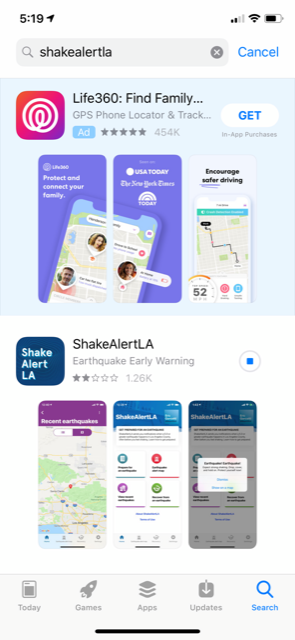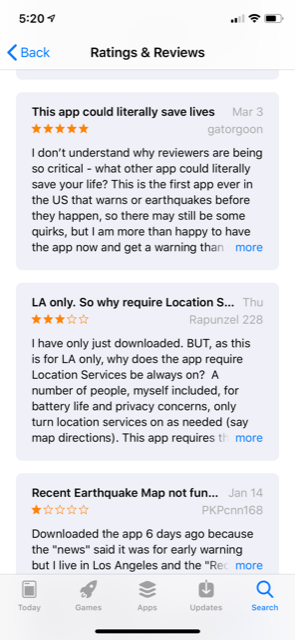Shake Shake Shake
- Mary M Brinkopf
- Jul 7, 2019
- 5 min read

I always seem to find myself living in cities beset by inclement weather.
As a child, I grew up in the Midwest, in a region known as "Tornado Alley," where hiding underneath your desk or in rooms with no windows or basements was the norm.
In my teens, I lived in Southwest Florida where evacuations from deadly hurricanes was a common occurrence in the fall - often cutting into my spring breaks as we had to make up school days.
In my early twenties, I lived along the Eastern seaboard where winter storms closed down cities or office buildings due to freezing rain or copious amounts of snow.
It was only a matter of time until I faced that great, next obstacle of Mother Nature - earthquakes. For the record, I had lived through one earthquake prior to 2016 when I spent a summer in Japan. But this time it was different - I was going to the epicenter of Quake Town on the West Coast.
Yet, in the past three years, that big quake that I kept hearing about on the news never came, that is, until earlier this week. Two quakes made headlines on July 4 outside of the Los Angeles area and I was…conveniently out of town.
Given that I missed the "big shake" - it got me thinking: How is it that seismologists and technologists cannot predict when earthquakes will happen? In 2019, our scientists can predict nearly all types of natural disasters -
Tornadoes
Hurricanes
Volcanic Eruptions
Tsunamis
Flash flooding
Fires
Yet earthquakes remain one of the biggest holdouts in terms of predictability. Why is that? How is it that scientists can send space ships to distant places like Jupiter, Pluto and Mars but we cannot predict when the very ground beneath our feet will shake?
Naturally, I learned the answer to that question is more complex. It comes down to the tools and technology available today. For example, the National Weather Station utilizes a combination of supercomputers, modeling, NOAA observation systems, radar and satellite to deliver forecasts to consumers.
The biggest issue for scientists? Earthquakes cannot be captured on two of those technologies (and what I would argue are the more important systems) - radar and satellite. Despite that impediment, scientists can predict "where" earthquakes will occur using supercomputers and predicative modeling.
The key piece is figuring out "when." And in the last twenty four months, major strides have been made on this issue.
Enter ShakeAlert.
A combination of science and technology, ShakeAlert is an earthquake early warning (EEW) system developed by the U.S. Geological Survey (USGS) and institutions (mostly universities along the West Coast).
To be clear, ShakeAlert does not predict earthquakes, (we still haven't figured that one out) the intent is to provide early warning to businesses and the general public in the impacted areas through a text message. Recall that consumers already receive public service announcements like Amber Alerts already through text messages today.
As the website advocates:
"ShakeAlert can give enough time to slow trains and taxiing planes, to prevent cars from entering bridges and tunnels, to move away from dangerous machines or chemicals in work environments"
Note - if you want to understand the science behind ShakeAlert, visit their YouTube page.
The good news is - the system works. Just after the 7.1 Ridgecrest earthquake on July 4th, the USGS showcased the power of their tool. I highly recommend you watch the video where the system was able to predict, down to the second, when the shaking would commence in a majority of the impacted areas (with the exception of Ridgecrest).
Here's the rub though and it's a big one - the system is still in "beta" mode - meaning it's not ready for general deployment across the West Coast. That means that not everyone located on the West Coast has access to the alert system.
Luckily enough for me, I happen to live in one of the cities that is testing ShakeAlert. In the fall of 2018, the city of Los Angeles utilized the ShakeAlert system and made an app (ShakeAlertLA) available to the general public. In March 2019, The Los Angeles Times reported that the app had been downloaded more than 400,000 times (overwhelmingly, users skewed towards Apple devices than Android).
Ironically, I heard about the app through my mother and downloaded it to iPhone and I was…disheartened.
First, it had terrible reviews in the Apple app store with 1.9 out of 5.0 stars. Reviewers were upset over the design interface (we'll get to that in a minute), enablement of location services, privacy and overall usability. All of which I agree with. Amidst these bad reviews, in March 2019, the city conducted a Q&A with The Los Angeles Times where it discussed user feedback and validated it did not store device data.
This leads to my second point - the app itself. To be honest, it's a mess and difficult to navigate. Although it houses helpful information like "Prepare for an Earthquake" or "Recover from an Earthquake" the two most valuable functions - "Earthquake alert map" and "View recent earthquakes" were utterly useless. Try as I may, I could not find any recent earthquakes in my area (even the ones from July 4th were excluded).
Note - ShakeAlertLA has responded to queries like mine stating that they only publish alerts or include in the app "an earthquake of greater than magnitude 5.0 or level IV intensity." Remember this tidbit.
Third, the app has near non-existent social media presence. Since they opened their Twitter page in January, the team has published ONE tweet (see below) - even AFTER the earthquake on July 4th when it probably had a significant number of visits to their Twitter page. (Note - the screen capture below is from July 6th).

Overall, the app itself was an immense disappointment - I quickly deleted it within 30 days of download until I felt compelled to re-install after the latest quakes. Unfortunately, the experience has not improved.
Note - in March 2019, the city indicated the app had a 16% deletion rate, below industry average.
And I was not the only person unimpressed with the app. Mere hours after the earthquakes in Southern California, news outlets like The Los Angeles Times were up in arms over the perceived "failure of ShakeAlertLA" to warn residents about the July 4th earthquakes.
To ShakeAlertLA's credit, they indicated that residents of Los Angeles did not receive a EEW text message because "it [the earthquake] didn't meet the threshold for the L.A. area."
Basically, although suburban areas like Ridgecrest experienced intensities above 5.0, anyone living in Los Angeles proper (like myself) did not experience shaking at that level. As Robert-Michael de Groot of the USGS stated -
"The part that we’re trying desperately to communicate is the fact that they will only send out a ShakeAlert — that is, the message — if a particular area experiences a level of shaking that’s potentially damaging.
This is why we’re saying that it worked exactly as intended because the earthquake was out in Ridgecrest, which is about 150 miles or so from Los Angeles. And so the predicted shaking intensities in LA County were lower than this basic threshold. So they didn’t send it because it didn’t meet the criteria to send it."
In response to public outcry, ShakeAlertLA announced (almost immediately) that they would amend the notification thresholds - meaning less intense earthquakes will be reported in the future.
Despite the hiccups experienced in the last week and my overall dissatisfaction with the app, I remain hopefully. Why? Because the science is there and there is significant government oversight (meaning it has been through multiple review boards). Unlike more recent scandals (i.e. Theranos) where consumers were promised a product but received only disappointment, the issues with ShakeAlert and more specifically, ShakeAlertLA are fixable. I just hope they fix those issues before the next quake hits.






